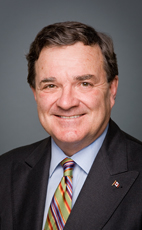moved for leave to introduce Bill C-51, An Act to implement certain provisions of the budget tabled in Parliament on January 27, 2009 and to implement other measures.
(Motions deemed adopted, bill read the first time and printed)
 House of Commons photo
House of Commons photoWon his last election, in 2011, with 58% of the vote.
Economic Recovery Act (stimulus) September 30th, 2009
moved for leave to introduce Bill C-51, An Act to implement certain provisions of the budget tabled in Parliament on January 27, 2009 and to implement other measures.
(Motions deemed adopted, bill read the first time and printed)
Taxation September 29th, 2009
Mr. Speaker, the decision on whether or not to harmonize was made by those provinces that have not yet harmonized. The discussions that I had with the Province of British Columbia began after the provincial election in British Columbia.
Ways and Means September 18th, 2009
moved that a ways and means motion to implement certain provisions of the budget, tabled in Parliament on January 27, 2009, and to implement other measures, be concurred in.
Taxation September 16th, 2009
Mr. Speaker, the member ought to look at the last generation in Canadian history and go back to when the previous governments worked with the provinces of New Brunswick, Nova Scotia, and Newfoundland and Labrador when they decided to harmonize their taxes, more recently with the provinces of Ontario and British Columbia, and the province of Quebec may as well at one time.
There are other provinces that have not made the decision to harmonize. As I have said repeatedly, this is a decision for the provincial governments, not for the Government of Canada.
Infrastructure September 16th, 2009
Mr. Speaker, I was in Vancouver last week and I saw the Canada Line. It was actually in downtown Vancouver.
The decision on harmonization, as I said in the House the other day, is a decision for the provinces that have not yet harmonized. There is a federal proposal that is the same for every province, and some provinces over the years have chosen to harmonize and others have not. Ultimately of course it is a decision for the provinces to make.
As the Leader of the Opposition said, and this is the Liberal Party position, I think, “We support harmonization. We have no criticism of the Ontario government's budget. We think it is--
Employment Insurance September 16th, 2009
Mr. Speaker, the employment insurance program is an important social program. We agreed in Parliament, Parliament supported it, that the program should pay for itself except during the time of recession, when we need to stimulate the economy.
That is why we froze premiums for a period of two years. This was supported by Parliament. It should pay its own way and not what the party opposite did. When the Liberals were the government, they built up a slush fund and used it for their private projects and for their own edification.
Employment Insurance September 16th, 2009
Mr. Speaker, as part of the economic action plan, we included freezing EI premiums for two years at substantial cost. After the economic statement, it is finished. It is a temporary plan. It is what Parliament voted for.
After the stimulus ends, and it will end, then we will move back toward surplus. EI premiums, as set by the board with the authority of Parliament in 2008, will go forward in the normal way.
What we will not do is raise taxes like the member for Markham—Unionville says, “raising taxes is certainly a mathematical possibility in one way or another”.
Employment September 16th, 2009
Mr. Speaker, we are committed to Canadians in the process of preparing our third economic report to Canadians which will be ready soon.
I can say that the job creation and the job maintenance figures are even better than we had in the economic action plan.
Employment September 16th, 2009
Mr. Speaker, the member opposite quotes selectively from the OECD report. The OECD said that the Canadian unemployment rate would remain much better than that in the United States. That is the first time that has happened in a generation.
The OECD also said that Canada's fiscal stimulus package should have a relatively large effect in stemming job losses.
The question the opposition Liberals need to ask themselves is why they are voting against the economic stimulus package. Why are they doing that when Canadians need it and when Canadians need the job help? Why are the Liberals voting against those things?
The Economy September 15th, 2009
Mr. Speaker, in the economic action plan we have probably the largest innovation in savings for Canadians since the RRSP in the 1950s and that is the tax free savings account. This will revolutionize savings in Canada. All Canadians are eligible to participate. There is good take-up across the country and it will be even more important year after year as more and more Canadians invest in tax free savings accounts and earn interest tax free.